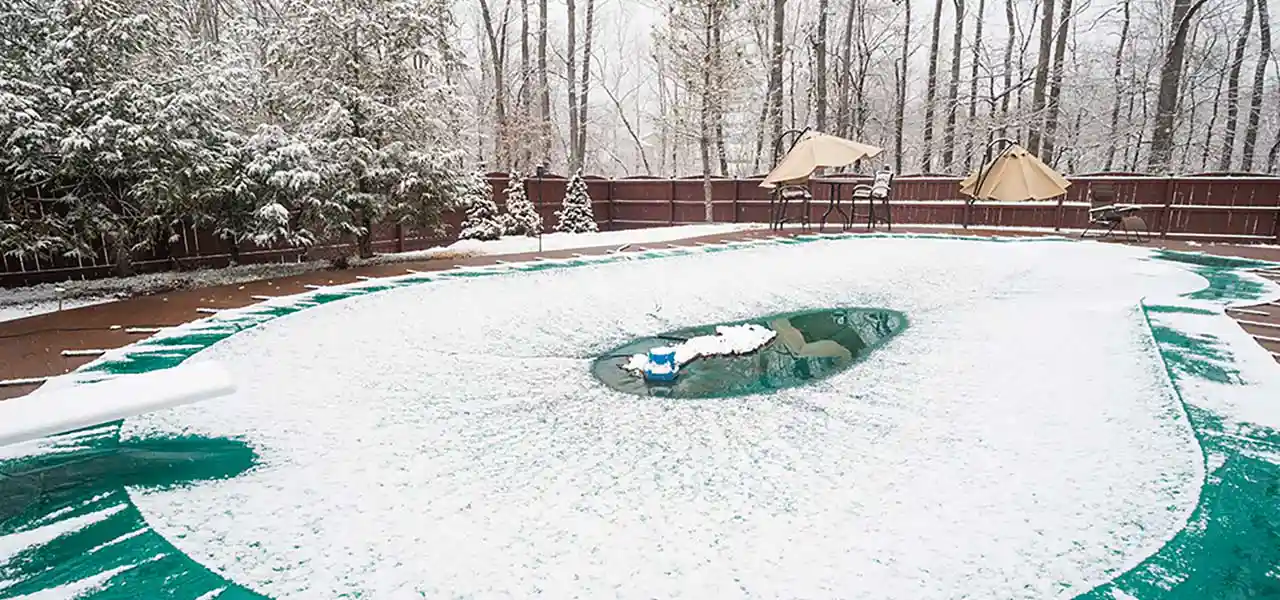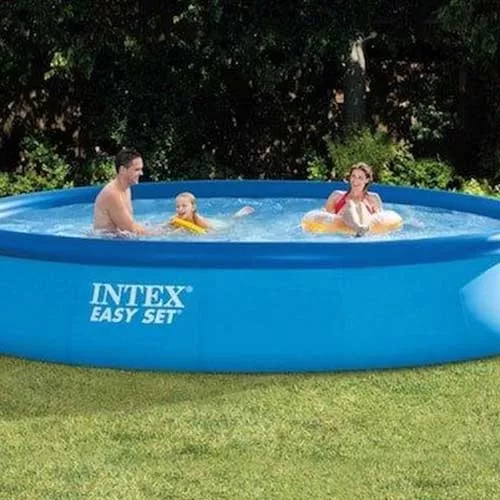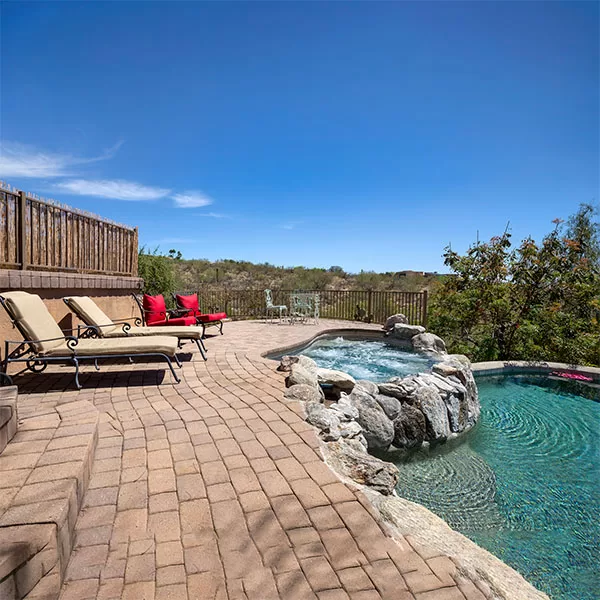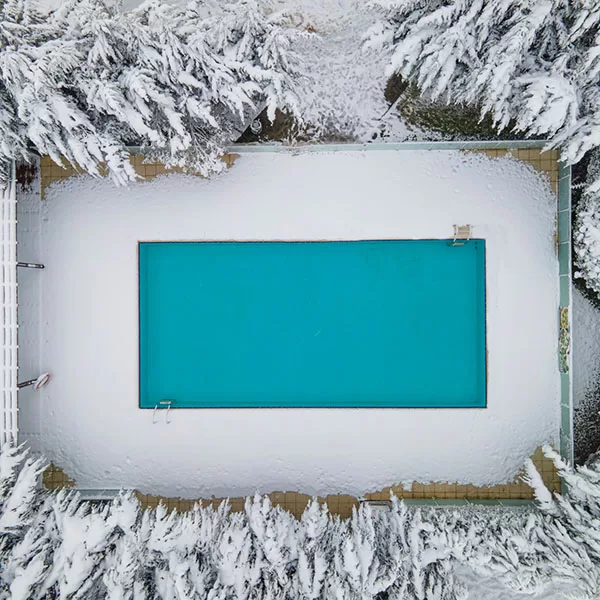FREE Standard Shipping On All Orders $100 or More!*

Winter Pool Safety Tips
It's true – more accidents happen around the pool during the warmer summer months. However, serious tragedies can and do occur during the off-season, in both warm-weather sunbelt pools and in frozen northern pools. It's important to freshen up your winter pool safety knowledge with a few of our helpful tips.
It's easy to be less aware of the pool and the danger it presents during winter. Who would want to go swimming, anyway? In that cold water?! Even so, it's important that you don't let your guard down during the winter months. Accidental submersion by the very young or very old, or even falling on the pool cover with as little as an inch of water on it, can be lethal.
Always be cognizant of people and pets wandering near the pool during the off-season, especially if you don't have a lockable fence enclosure or a safety pool cover. If your home will be host to guests during the holidays, whether for a small party or a large holiday feast with family, stay vigilant with pool safety so your guests make it home safely.
Here are a few tips for pool safety during winter. We've also included some advice on improving safety for pools that use solid, floating winter pool covers.
Winter Safety Tips for Pools

Inflatable Pools
Inflatable pools should not be left up during winter. Period. The best safety effort for inflatable pools, such as the Intex Frame Set or Easy Set pools, is to drain them, dry them, fold them, and store them. Because these pools are rarely fenced in or situated with a pool alarm, they can pose a serious threat. Their soft, flexible sides make it easy for children and even animals to shimmy their way into the water.
So, unless you are in the deep, warm south and you're using the pool regularly, just store your portable pool for the winter. It will be best for the pool, as well as the safety of those around you.
Above Ground Pools
When we're talking about steel sided above ground pools, there are a few key safety measures that will help keep your loved ones safe during the winter.
- Remove any items in the backyard that could be used as a step.
- Remove or lock any ladders connected to an attached pool deck.
- If the pool deck is attached to the house, install a secondary safety fence to prevent access to the pool.
- If you have a complete surround deck, install a safety cover.
Inground Pools
For inground pools, there are often different safety considerations you should take into account. To maintain a safe pool area this winter, follow these tips.
- Inspect your fence regularly for needed repairs during winter.
- Lock any gates that are not used frequently.
- If using a solid winter cover with water bags, you can still use a pool alarm to alert you to water disturbances.
- Keep solid pool covers pumped off, clean, and over-weighted.
- When possible, install a safety cover.
Winter Safety Tips for Sunbelt Pools

Pool owners in southern states or areas of mild winters don't always winterize the pool. And most typically don't cover the pool for winter, either. This can make winter pool safety more challenging, especially when the pool is not top of mind as it is during summer.
Safety Covers: At a cost of $1-2 per sq. ft. for rectangle and $2-4 per sq. ft. for custom safety covers, for many sunbelt pools, a safety pool cover is the answer for increased winter pool safety. This type of cover also keeps the pool clean, and reduces chemical use and water evaporation.
Safety Nets: At a cost of $2-4 per sq. ft., safety nets are usually installed by a dealer. They allow you to see the pool water while effectively preventing pool entry by kids, pets, or wildlife. Safety nets tend to be easier to remove and reinstall than safety covers, but perform in a similar manner.
Safety Fence: At a cost of $9-$15 per linear foot, removable pool safety fences enclose the pool. They can connect to existing walls or property fence during winter, and then can remove and roll up for easy summer storage. One of the benefits is that they allow easy access to the pool for cleaning or chemical tests when needed, and they act as an effective barrier against pool entry.
Be sure that your pool fences are in good repair and that your gates are self-closing and self-latching. Pool owners have the responsibility to keep their pool safe for everyone in their home and community.
Winter Safety Tips for Snowbelt Pools

For the pool that is winterized, dangers can still exist around the pool. A safety pool cover (mesh or solid) will provide the strongest safety barrier during winter. For those that have a floating solid pool cover, there are several safety concerns you should be aware of.
Solid Pool Covers: They don't allow water to pass through to the pool, and if not pumped regularly to remove rain and snow melt, they quickly become a dark and murky danger. Even automatic covers or solid safety covers are dangerous when not pumped off. But floating solid covers, the types that use water bags, can be especially dangerous. Invest in a quality pool cover pump to avoid these types of issues.
Even with a clean solid cover, the floating style of winter covers can still pose a safety hazard. When a child or animal falls onto a floating solid cover, it immediately envelopes them like in the photo to the right, pulling surface water towards them quickly. The cover wraps tightly around the legs and body, with the water weight inside the pool pressing in. Struggling only pulls you in deeper, like quicksand.
Fencing: Aside from a safety cover, your pool fence is your best protection. Secondary fencing can be used to separate the back patio from the pool area, if needed. Removable mesh pool fencing panels can be connected to the pool fence or wrap around the back porch. The 10' panels are relatively easy to manage.
Door Alarms: If the back of your house is the fourth side to your pool fence, and the rear doors lead out to the pool, install door alarms on the back doors, to sound a loud alert if the back door is opened (when the pass through button is not pushed).
Other Tips: Inspect your fence regularly for gaps, loose boards or leaning posts. For gates that aren't padlocked, be sure that they are self-closing and self-latching. Remove anything next to the fence or pool that could be used to climb over.
Final Thoughts
It's altogether normal for some complacency to creep in during the winter. Besides, you don't think about the pool too much once summer's over. The threat of drowning or hypothermia is real, however. It's important to stay vigilant and practice common sense pool safety measures to avoid harm to your loved ones.
Solid pool covers are a popular type of winter cover. However, they can be dangerous for very young or very old people, or for large animals, who happen to fall on them. The weight of a person causes the cover to wrap tightly around them, while any rain water on top comes rushing towards the low spot in the cover.
The same is true if you try to walk across a solid, floats-on-the-water type of pool cover. You'll get about two steps in, and be quickly swallowed up by the cover. It makes any movement difficult, and just like quicksand, the more you struggle, the deeper you'll sink.
Safety pool covers can support the weight of a car or an elephant, so they're more than sufficient for protecting people and pets. If you have a safety pool cover, either mesh or solid, you can rest easy during the winter, and be confident in the security they provide.
Safety covers can last for 12+ years. They look great, are low maintenance, and are the best form of winter pool safety you can provide for your family, friends, and pets.
If a safety cover isn't in the cards for this season, play it safe! Follow the guidelines above, and keep pool safety top of mind this winter.